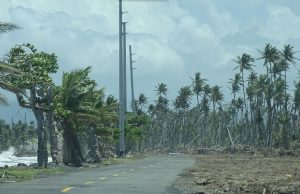EPIC included in $300,000 US DOE project

North Carolina has received a $300,000 competitive award from the U.S. Department of Energy for a joint project by the N.C. Department of Environmental Quality (DEQ), UNC Charlotte’s Energy Production Infrastructure Center (EPIC), and the NC Clean Energy Technology Center (NCCETC) at NC State University. “We are partnering on a project that will examine storm-related impacts and the costs and benefits of investments in grid resiliency as recommended in the NC Clean Energy Plan,” said Sushma Masemore, State Energy Director.
The two-year project, “Planning an Affordable, Resilient, and Sustainable Grid in North Carolina,” will include opportunities for interested stakeholders to review the metrics developed by the research team and to provide input into an advanced grid scenario focused on enabling a more decentralized resilient grid, including micro/mini grids that can support critical services, such as hospitals, in the case of power outages.
EPIC Associate Director Robert Cox added that “The cost to society after a major weather-related disaster can be far greater than the cost required to invest in resilience, but unfortunately, there are not good methods or metrics to evaluate these investments.” To address this question, EPIC will analyze outage data provided by Duke Energy following major weather-related disasters that have impacted North Carolina over the last several years. Once this baseline information is known, EPIC will consider the potential impact of Duke Energy’s proposed grid-hardening measures, including distribution automation and undergrounding power lines. The team will also consider the potential impact of the advanced grid scenario that would include incentives for micro grids and other advanced technologies.
“The NCCETC will lead an initial stakeholder meeting in mid-2020 to seek input into and comment on the technical and economic analysis on the improved and advanced scenarios,” said Anne Tazewell, NCCETC Special Project Program Manager. A second meeting will provide opportunities for stakeholders to consider a third scenario that will include the technical, policy, and economic analysis conducted, while also taking into account future affordability, reliability, and resilience. Finally, a roadmap that combines the techno-economic analysis and stakeholder input will be developed to help inform future utility resilience-related processes.
For more information contact:
DEQ State Energy Program: Starlette Hodge, star.hodge@ncdenr.gov
UNC Charlotte EPIC: Rob Cox, robert.cox@uncc.edu
NCCETC: Anne Tazewell, aetazewe@ncsu.edu
Sign up to be informed of stakeholder meetings by clicking HERE
About the N.C. Department of Environmental Quality
The mission of the N.C. Department of Environmental Quality (DEQ) is to provide “science-based environmental stewardship for the health and prosperity of ALL North Carolinians.” For more information about DEQ’s State Energy Program visit https://deq.nc.gov/energy-climate/energy.
About the N.C. Clean Energy Technology Center
The N.C. Clean Energy Technology Center, as part of the College of Engineering at North Carolina State University, advances a sustainable energy economy by educating, demonstrating and providing support for clean energy technologies, practices, and policies. For more information about the N.C.Clean Energy Technology Center, visit: http://www.nccleantech.ncsu.edu. Twitter: @NCCleanTech
About the Energy Production and Infrastructure Center
Located on the campus of UNC Charlotte, the Energy Production and Infrastructure Center (EPIC) was formed through private and public funding in response to the need to supply well-educated and highly trained engineers qualified to meet the demands of the energy industry, and to provide sustainable support for applied research. Offering a collaborative industry/academic partnership, EPIC produces a technical workforce and advancements in technology for the global energy industry while supporting the Carolinas’ multi-state economic and energy security. For more information about EPIC visit: https://epic.charlotte.edu/